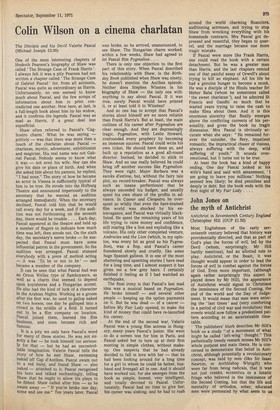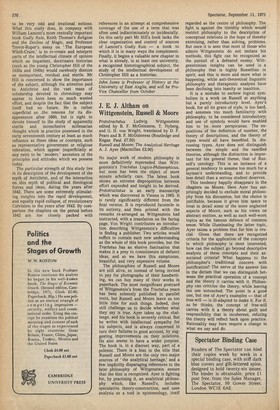John Jones on the myth of Antichrist
Antichrist in Seventeenth Century England Christopher Hill (OUP £1.50) Most Englishmen of the early seventeenth century believed that history was providentially directed, and that as part of God's plan the forces of evil, led by the Devil (whom, surprisingly, Mr Hill hardly mentions), had an allotted role to play. Antichrist, or the Beast, it was thought would appear in order to lead the forces of evil in combat against the forces of God. Even more important, (although again rather surprisingly this aspect is played down by Mr Hill), the appearance of Antichrist would signal to Christians the imminence of the Second Coming, the end of the world and the Day of Judgement. It would mean that men were entering the 'last times' and (very comforting in a period of civil war and revolution) that events would now follow a predestined pattern according to an ascertainable timetable.
The publishers' blurb describes Mr Hill's book as a study "of a movement of what might be called ' left-wing ' thought." This pathetically trendy remark misses Mr Hill's whole purpose and main thesis. He is concerned to demonstrate that belief in Antichrist, although potentially a revolutionary concept, was held by men (like Sir Isaac Newton, or Archbishop Whitgift) who were far from being radicals, that it was not just cranks, eccentrics or a lunatic fringe who believed in the imminence of the Second Coming, but that the life and mentality of orthodox, sober, educated men were permeated by what seem to us to be very odd and irrational notions. What this study does, in company with William Lamont's more centrally important book Godly Rule, Keith Thomas's Religion and the Decline of Magic, and Professor Trevor-Roper's essay on 'The European Witch-Craze,' is to re-create and interpret parts of the intellectual climate of opinion which an impatient, doctrinaire historian (such as the young Christopher Hill of the 1930s and 1940s) would carelessly dismiss as unimportant, residual and sterile. Mr Hill is concerned to show the importance of the subject, although the attention paid to Antichrist and the vast mass of scholarship devoted to chronology may appear to have been so much wasted effort, and despite the fact that the subject itself had no future. He is rather superficial on .the reasons for its disappearance after 1660, but is right to devote himself to the study of apparently sterile and inconclusive millenarian thought which in practice possessed in the early seventeenth century at least as much influence as those ideas or concepts, such as representative government or religious teleration, which appear (superficially at any rate) to be 'modern' ancestors of the principles and attitudes which we possess today.
The particular strength of this study lies in its description of the development of the myth of Antichrist, and of the interaction on this myth of political and theological forces and ideas, during the years after 1642. There are some extremely stimulating insights into the rapid development, and equally rapid collapse, of revolutionary Calvinism in the years after 1642. By comparison the chapters on the period before 1642 are too closely packed with references in an attempt at comprehensive coverage of the use of a term that was often used indiscriminately or incidentally. On this early part Mr Hill's book lacks the clear organization and control of sources of Lamont's Godly Rule — a book to which it is in many ways the complement. Finally, it begins a valuable new chapter in what is already, in at least one university, a recognized historiographical subject, the study of the intellectual development of Christopher Hill as a historian.
John Jones is Professor of History at the University of East Anglia, and will be ProVice Chancellor from October











































 Previous page
Previous page